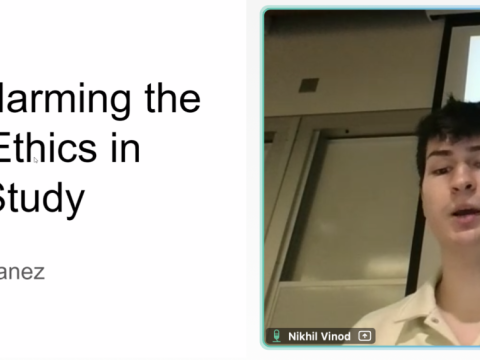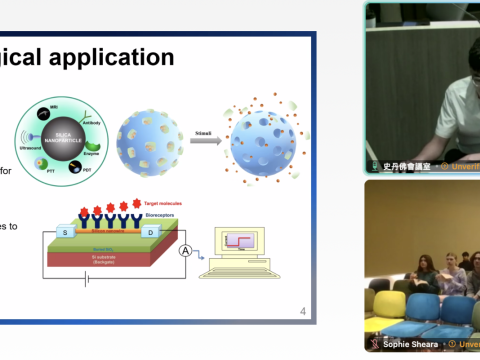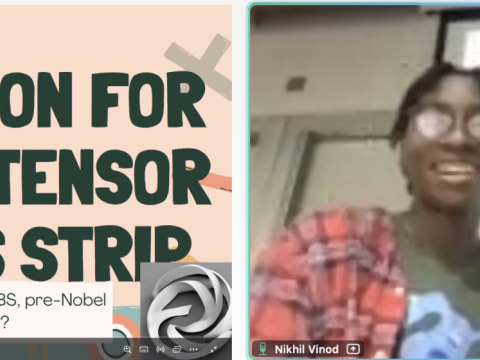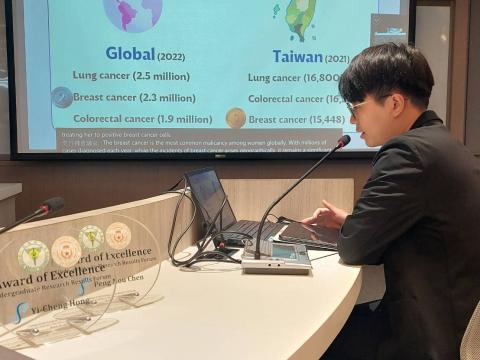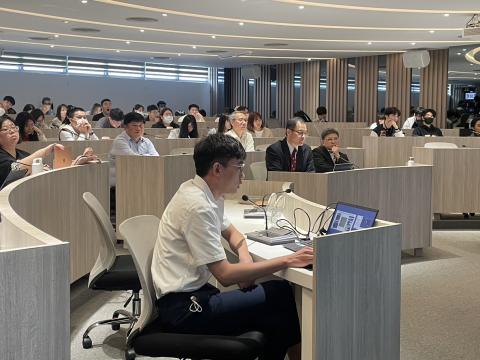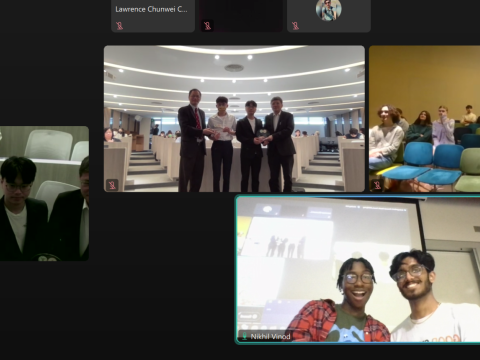2024.03.28日(Thr.)「Undergraduate Research Results Forum」
China Medical University’s College of Life Sciences (CMU CLS) and The University of Texas at Austin’s College of Natural Sciences (UT CNS) Dean's Scholars program launched the joint "Undergraduate Research Results Forum" in April 2022. This all-English undergraduate academic exchange is held every semester because of the overwhelming positive response from students of both universities. UT CNS Dean's Scholars is a four-year honors degree program designed for highly motivated and talented students interested in scientific research who can earn a Bachelor of Science Honors degree in many UT CNS majors. The fifth academic exchange was expanded in scale and held on March 28, 2024.

Once again, we invited CMU Vice President John S. Kuo to serve as the opening speaker, introducing Dean Shih-Chieh Hung of the College of Life Sciences, and the special speaker David C. Chan MD PhD of Caltech. Professor Chan serves as the Dean of Graduate Studies at California Institute of Technology and is also the Alvarez Chair professor of biology. Dr. Chan graduated with both MD PhD degrees from Harvard, trained as a postdoctoral fellow at MIT Whitehead Institute and was funded by a distinguished Howard Hughes Medical Investigator for many years for his pioneering studies on the molecular biology of mitochondria (the cells source of energy) and human diseases. His concise and detailed talk was warmly received and generated many intriguing questions about the advancing frontiers and challenges of vaccine development. Vice President Kuo also invited Dean David C. Chan to visit Taiwan in the future, adding more possibilities for international exchanges between teachers and students on both sides. Next, four undergraduate students took turns at the ‘virtual podium’ to share their research results.

Peng Mou Chen, a senior from CMU’s Department of Biological Science and Technology (faculty advisor: Dr. Yit Lung Khung), presented " Room temperature hydrosilylation of a self-assembled monolayer on the silicon surface ". In this project, we investigate whether the presence of ester or carboxylic groups facilitates the hydrosilylation reaction at room temperature. By comparing the same reaction across three silicon surfaces with differing roughness levels, we aim to understand how surface roughness influences the grafting of monolayers. Looking ahead, these surfaces have the potential to serve as biological materials that enhance cell adhesion and differentiation. I would like to extend my gratitude to Dr. Yit Lung Khung for his invaluable assistance and feedback on this research, as well as to my group members for their substantial support in this study.
Yi-Cheng Hong, a sophomore from CMU’s Department of Biological Science and Technology (faculty advisor: Dr. Pei-Yin Hsu), presented " The potency of epigenetic therapy in treating HER-2 amplified breast cancer cells" Breast cancer is the major malignancy in female health. Approximately 80% of breast cancer cases express hormone receptors and HER2-positive subtype is the most aggressive and metastatic ones. Though Herceptin monoclonal antibody-directed targeted therapy is potent against HER2+ breast tumors, treatment-led heart problems and acquired resistance indicate the need of establishing an alternative therapeutic strategy. For epigenetic modulation has been demonstrated to participate in tumorigenesis, we examined the efficacy of 150 epidrugs on three independent HER2+ breast cancer cell models and found that to identify that sulforaphane effectively reduce cell viability through halting nutrient-sensor mTOR signaling. We are working on the further mechanistic interrogation. In this talk, I learned how to prepare and give a formal scientific presentation. Also, I indeed got experience how to be calmly answer questions.
Two UT CNS Dean’s Scholars also shared their research projects. Chinonso Obiefule, presented "A calculation for the riemannian metric of a möbius strip". Talon Blottin, who spoke about "Curing the brain, harming the self: disability ethics in neurologic study”.
For this joint forum, both physical (Stanford Conference Room) and videoconference were used in parallel with students from both universities taking turns to orally share results of research projects followed by Q&A. CMU’s Stanford conference room was filled to capacity, and the total number of participants from both schools included over 90 students and faculty. The audience eagerly asked questions and discussions, demonstrating high enthusiasm for this international scientific research exchange with exciting research results shared by the four outstanding students. In appreciation, CMU-CLS awarded medals and certificates to all of the outstanding speakers for their excellent research performance. On-site participants also received certificates of attendance for this international undergraduate research forum. We continue this important international cooperation and exchange as a long-term collaboration.

At the end of the forum, everyone happily took photos and ended the discussion in a joyful atmosphere, looking forward to the next event in fall 2024. In addition, CMU-CLS will work with UT Austin to start planning bilateral on-site visits and student summer exchange programs as part of the overall international initiative between UT Austin and CMU. CMU-CLS aims to promote international engagement and collaboration, and actively cultivate high caliber researchers and scholars that will make significant scientific contributions to the world.


